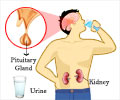
“What’s compelling from this study is that if vasopressin levels track this social behavior, it might suggest that kids who have the greatest impairments in these levels might benefit the most from vasopressin treatments,” senior study author Karen Parker, an associate professor of psychiatry and behavioral sciences at Stanford University School of Medicine.
Vasopressin is a small-protein hormone, structurally similar to oxytocin and plays a role in social behavior. Researchers studied the “theory of mind” trait, the understanding that people’s intentions, feelings and goals are separate from one’s own Children with typical development understand this idea sometime between ages 6 through 8.
In their study researchers first measured cerebrospinal fluid to determine whether vasopressin levels in the blood reflected the hormone’s levels in the brain.
Also, researchers tested children with standard psychiatric assessments, including measuring their social responsiveness, and had blood samples taken.
In those children with autism, researchers found a strong positive relationship between the level of vasopressin in blood and the child’s performance on the tested social task.
Advertisement
Because the range of abilities in children with autism varies, neuroscientists like Parker hope that identifying a biological sign may identify different subtypes of autism, and therefore who responds best to different drugs.
Advertisement
“Our hope is to eventually give a biological profile to these kids and ask which in the arsenal are the therapies, the drugs, that would be the most beneficial for the child,” she said.
Source-Medindia













